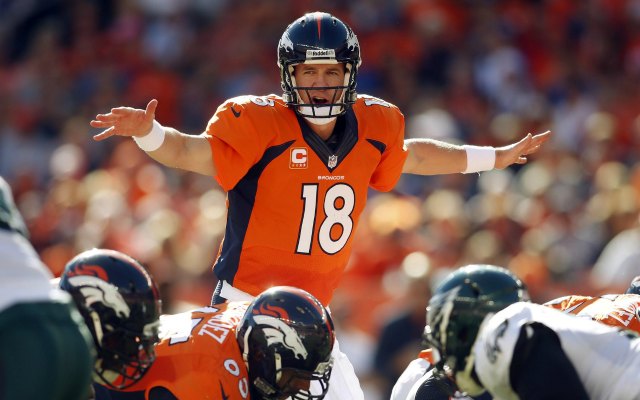Oregon has been to four BCS bowls and an Alamo in the last five seasons, 47-6 in the decade, best in college football.
Yet the Ducks recruiting classes typically fall between 15th and 25th in most rankings.
Smooth operator: Kenjon Barner was a 3-star defensive back when he came to Oregon. He left as the second-leading rusher in school history, and garnered an NFL contract.
The Ducks beat the odds in six ways:
Superb talent evaluation
Duck successes in the recruiting wars are legendary, and it begins with spotting good players before the crowd, plucking overlooked and undervalued players who fit the Oregon system. Here are some examples: Marcus Mariota. LaMichael James. Kenny Rowe. In the Mariota year, the Ducks were also among the first to offer Tajh Boyd and Johnny Manziel.
In this year's class, Haniteli Lousi, Tyrell Crosby, Tua Talia and Jalen Jelks are all underrated athletes who could blossom into impact players as Ducks. Quarterback Morgan Mahalak was a relative unknown when he got his Oregon offer, a smooth-throwing passer who hadn't yet started for his high school team, playing behind current Cal starter Jared Goff.
The Ducks emphasize speed, ability and attitude, and look for players with all three.
Exceptional player development
The Ducks haved thrived in taking versatile athletes and finding creative ways to get them on the field. Terrance Mitchell was a 2,000-yard tailback in high school. Kenjon Barner was recruited as a defensive back, as was Jeff Maehl. Brandon Bair came to Oregon as a skinny tight end. Spencer Paysinger began his Duck career as a wide receiver; now he's a starter at linebacker for the New York Giants. Jake Fisher was a tight end and defensive tackle in high school; the Ducks turned him into a three-year starter at offensive tackle.
Jim Radcliffe and his staff are legendary for transforming bodies, replacing baby fat with muscle, giving players the extra edge with training that emphasizes quickness, explosiveness and flexibility.
In 2014, look for the Ducks to find the right spot for Budda Baker, who played defensive back yesterday in the Army All-American game. Versatile 5-star athlete Juju Smith still has Oregon interest, as do Myles Autry and Mattrell McGraw. All three could be dangerous on offense or defense, but if they came to Eugene, trust that the Oregon staff would do an exceptional job of getting them in the right place.
Recruiting for character, academic fitness and fit
Oregon has an astounding four-year streak of qualifying and enrolling every athlete who signed a letter of intent. While there has still been normal attrition, transfers and dismissals, injury retirements, the Ducks don't waste scholarships, and gravitate toward goal-oriented players who get it. It's a practice that reflects thorough recruiting evalation and tends to build teams that are cohesive, mature and resilient.
Outstanding internal team leadership
The Ducks look for talent with character, and that has paid off big-time in a core of athletes who advance and speak for team goals. Michael Clay, Kenjon Barner, Brian Jackson, Ifo Ekpre-Olomu and Hroniss Grasu stand out as players who lead by example and represent the team with class and consistency. Part of the reason Oregon was so successful in the Chip Kelly era is that players like these completely bought in to the message and methods. They defined the Oregon Way, a team that exceeded expectations and revolutionized PAC-12 football.
Coaching continuity
While it's important to bring in fresh ideas and new blood, as the Ducks have done in adding Kelly, Matt Lubick and Jerry Azzinaro to the staff for recent seasons, having that core of long-time coaches who provide a consist message and sound fundamental teaching, Radcliffe, Campbell, Greatwood, Pellum, Neal and Osborne, pays huge dividends in maximizing player potential. Players aren't learning a new system every year. At some schools, a promising quarterback might have four different coordinators in four years. It sets back his development. As Matt Lubick put it, "We coach hard but we coach positive." Players thrive when there is stability and a consistent message.
The coaching staff was a big selling point for recruits like Baker, Jalen Brown, Henry Mondeaux, and Braden Eggert. They saw Oregon as a school where they would get great teaching and training, the opportunity to develop their talent. Last season when Kelly's abrupt departure left the 2013 class in doubt, the message of coaching continuity, "seven of us are still here, and we're not going anywhere" saved it.
Innovation
In facilities, scheme, marketing, uniform design, nutrition, and training, the Ducks lead with fresh ideas. The practice pace and up-tempo spread transformed Duck football, boosting productivity while making the Oregon brand more appealing to dynamic players. It's fascinating to hear how an 18-year-old from Georgia, Florida or Texas will describe an Oregon scholarship as a dream offer. Innovation made that happen, and fuels success.
Add The Sports Daily to your Google News Feed!
